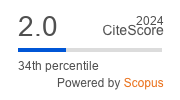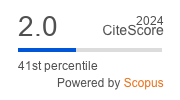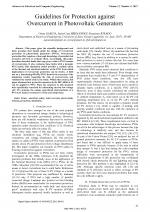| 4/2012 - 10 |
Guidelines for Protection against Overcurrent in Photovoltaic GeneratorsGARCIA, O. |
| Extra paper information in |
| Click to see author's profile in |
| Download PDF |
Author keywords
electrical safety, fault currents, photovoltaic systems, protection, simulation
References keywords
photovoltaic(21), systems(15), safety(10), power(10), energy(10), solar(7), hernandez(7), pvsec(6), pvsc(6), protection(6)
Blue keywords are present in both the references section and the paper title.
About this article
Date of Publication: 2012-11-30
Volume 12, Issue 4, Year 2012, On page(s): 63 - 70
ISSN: 1582-7445, e-ISSN: 1844-7600
Digital Object Identifier: 10.4316/AECE.2012.04010
Web of Science Accession Number: 000312128400010
SCOPUS ID: 84872798174
Abstract
This paper gives the scientific background and basic premises that should guide the design of overcurrent protection in photovoltaic generators (PVGs). Overcurrent protection first requires a thorough knowledge of potential risk scenarios and how to evaluate them. Accordingly, this paper describes electrical faults that may pose a risk to PVG because of overcurrents. It also evaluates these faults with a dynamic PVG model. This simulation model provides a realistic vision of the thermal and electrical behavior of the PVG from which implications of overcurrent protection can be drawn. A field test on a functioning 68-kWp PVG showed the accuracy of the simulation results regarding the risk of overcurrents, and validated the model used in our study. Within this context, this paper discusses how protective measures in the IEC 60364-4-43 can be applied to PVG. Since the measures in this standard were specifically conceived for alternating current low voltage (AC LV) systems, the unique operational characteristics of a PVG now make it necessary to revise and adapt them. |
| References | | | Cited By «-- Click to see who has cited this paper |
| [1] O. G. Garcia, J. C. Hernandez, F. Jurado, "Assessment of Shading Effects in Photovoltaic Modules," in: Proc. 2011 Asia-Pacific Power and Energy Engineering Conference, Wuhan, Mar. 2011, pp. 1-4. [CrossRef] [SCOPUS Times Cited 8] [2] J. C. Hernandez, O. G. Garcia, F. Jurado, "Photovoltaic Devices under Partial Shading Conditions," International Review on Modelling and Simulations, vol. 5, no.1, pp. 414-425, Feb. 2012. [3] D. L. Loveday, A. H. Taki, "Convective Heat Transfer Coefficients at a Plane Surface on a Full-Scale Building Façade," International Journal of Heat and Mass Transfer, vol. 8, no. 39, pp. 1729-1742, May. 1996. [CrossRef] [Web of Science Times Cited 159] [SCOPUS Times Cited 176] [4] IEC Std. 60364-1, "LV Electrical Installations - Fundamental Principles, Assessment of General Characteristics," IEC, 2005. [5] J. C. Hernandez, P. G. Vidal, "Guidelines for Protection against Electric Shock in PV Generators," IEEE Transactions on Energy Conversion, vol. 24, no. 1, pp. 274-282, Mar. 2009. [CrossRef] [Web of Science Times Cited 40] [SCOPUS Times Cited 65] [6] J. C. Hernandez, P. G. Vidal, F. Jurado, "Lightning and Surge Protection in Photovoltaic Installations," IEEE Transactions on Power Delivery, vol. 23, no. 4, pp. 1961-1971, Oct. 2008. [CrossRef] [Web of Science Times Cited 51] [SCOPUS Times Cited 83] [7] D. E. Collier, T. S. Key, "Electrical Fault Protection for a Large Photovoltaic Power Plant Inverter," in: Proc. 20th IEEE Photovoltaic Specialists Conference, Las Vegas, Sept. 1988, pp. 1035-1042. [CrossRef] [Web of Science Times Cited 19] [8] T. Key, D. Menicucci, "Practical Application of the National Electrical Code to PV System Design," in: Proc. 20th IEEE Photovoltaic Specialists Conference, Las Vegas, Sept. 1988, pp. 1110-1115. [CrossRef] [Web of Science Times Cited 1] [SCOPUS Times Cited 5] [9] ANSI/NFPA-70-Article 690, "National Electrical Code -Solar PV Systems," National Fire Protection Association, 2008. [10] M. Moechtar, M. Syafry-Syarief, Y. Effendi, "The Function of a Ground Sensor for Photovoltaic System Reliability," Renewable Energy, vol. 1, no. 2, pp. 177-182, 1991. [CrossRef] [SCOPUS Times Cited 1] [11] S. J. Durand, D. Bowling, V. V. Risser, "Lessons Learned from Testing Utility Connected by PV Systems," in: Proc. 21th IEEE Photovoltaic Specialists Conference, Kissimimee, May. 1990, pp. 909-913. [CrossRef] [Web of Science Record] [12] W. Wiesner, W. Vaaßen, F. Vaßen, "Safety Aspects for Installation and Operation of Grid Connected Photovoltaic Plants," in: Proc. 11th EU PVSEC, Montreux, Oct. 1992, pp. 1463-1067. [13] H. Laukamp, "The Basic German Electric Safety Standard and its Application to PV Systems," in: Proc. 12th EU PVSEC, Amsterdam, Apr. 1994, pp. 1868-1872. [14] H. Laukamp, G. Bopp, "Residential PV Systems Electrical Safety Issues and Installation Guidelines," Progress in Photovoltaics: Research and Applications, vol. 4, pp. 307-314, Jul. 1996. [CrossRef] [SCOPUS Times Cited 4] [15] R. Hotopp, K. Jaeger-Hezel, "On the Possibilities to Avoid Series Blocking Diodes and Bypass Diodes," in: Proc. 12th EU PVSEC, Amsterdam, Apr. 1994, pp. 1678-1681. [16] J. Wiles, "Photovoltaic power systems and the 2005 national electrical code: suggested practices," Nov. 2008. [17] IEC Std. 62548, "Solar Photovoltaic Energy Systems - Part 82/481/NP: Design Requirements for Photovoltaic (PV) Arrays," IEC, 2007. [18] IEEE Std. 1374, "Guide for Terrestrial Photovoltaic Power System Safety," IEEE, New York, 1998. [19] G. E. Ahmad, M. A. Mohamad, S. A. Kandil, R. Hanitsch, "Fault Detection in PV Generators Using an Improved Electronic Load," in: Proc. 14th EU PVSEC, Barcelona, Jun. 1997, pp. 199-202. [20] D. Stellbogen, "Use of PV Circuit Simulation for Fault Detection in PV Array Fields," in: Proc. 23th IEEE Photovoltaic Specialists Conference, Louisville, May. 1993, pp. 1302-1307. [CrossRef] [Web of Science Times Cited 42] [21] J. C. Wiles, D. L. King, "Blocking Diodes and Fuses in Low-Voltage PV Systems," in: Proc. 26th IEEE Photovoltaic Specialists Conference, Anaheim, Sep. 1997, pp. 1105-1108. [CrossRef] [Web of Science Times Cited 18] [22] G. Nofuentes, J. C. Hernandez, G. Almonacid, J. M. Abril, "Analysis of the Possibilities to Omit Blocking and Bypass Diodes Using a Standard Circuit Simulator," in: Proc. 14th EU PVSEC, Barcelona, Jun. 1997, pp. 1094-1096. [23] C. Bendel, E. Kunz, U. Rudolph, "Monitoring and Defect Diagnosis of PV Systems," in: Proc. 2nd World Conference on Photovoltaic Solar Energy Conversion, Vienne, Jul. 1998, pp. 2165-2168. [24] J. C. Hernandez, G. Almonacid, "Development of a Fault Detection System in a PV Installation," in: Proc. 2nd World Conference on PV Solar Energy Conversion, Vienna, Jul. 1998, pp. 2131-2134. [25] C. Kuei-Hsiang, L. Ching-Ju, H. Sheng-Han, "Modeling and Fault Simulation of Photovoltaic Generation Systems Using Circuit-Based Model," in: Proc. 2008 International Conference on Sustainable Energy Technologies, Singapore, Nov. 2008, pp. 290-294. [CrossRef] [Web of Science Times Cited 21] [SCOPUS Times Cited 36] [26] IEC Std. 60364-4-43, "Low-Voltage Electrical Installations - Protection for Safety - Protection against Overcurrent," IEC, 2008. [27] H. Laukamp, G. Boop, L. Niebers, "The Hazard of Electric Arcs in Residential PV Systems Assessment and Installation Guidelines," in: Proc. 11th EU PVSEC, Montreux, Oct. 1992, pp. 1444-1447. [28] M. Drif, P. J. Perez, J. Aguilera, G. Almonacid, P. Gomez, J. D. L. Casa, "Univer Project. A Grid Connected Photovoltaic System of 200 kWp at Jaen University. Overview and Performance Analysis," Solar Energy Materials & Solar Cells, vol. 91, pp. 670-683, Feb. 2007. [CrossRef] [Web of Science Times Cited 96] [SCOPUS Times Cited 116] [29] J. H. Boumans, A. J. N. Schoen, S. A. M. Verhoeven, "Test Facilities and Safety Regulations for Rooftop Mounted and Grid-Connected PV Systems," in: Proc. 1st World Conference on Photovoltaic Energy Conversion, Waikoloa, Dec. 1994, pp. 1024-1027. [CrossRef] [30] IEC Std. 60364-7-712, "Electrical Installations of Buildings -Requirements for Special Installations or Locations - Solar PV Power Supply Systems," IEC, 2002. [31] J. C. Hernandez, P. G. Vidal, A. Medina, "Characterization of the Insulation and Leakage Currents of PV Generators: Relevance for Human Safety," Renewable Energy, vol. 35, pp. 593-601, Mar. 2010. [CrossRef] [Web of Science Times Cited 54] [SCOPUS Times Cited 83] [32] W. Knaupp, "Standardization of Data Sheet and Nameplate Specifications of PV Modules," in: Proc. 25th IEEE Photovoltaic Specialists Conference, Washington, May. 1996, pp. 1303-1306. [CrossRef] [Web of Science Times Cited 1] [SCOPUS Times Cited 1] [33] IEC Std. 61730 series, "PV Module Safety Qualification," IEC, 2004. [34] IEC Std. 62109-1, "Safety of Power Converters for Use in Photovoltaic Power Systems - General Requirements," IEC, 2010. [35] IEC Std. 62109-2, "Safety of Power Converters for Use in PV Power Systems - Particular Requirements for Inverters," IEC, 2011. [36] P. G. Vidal, G. Almonacid, P. J. Perez, "Measures Used to Protect People Exposed to a PVG: Univer Project," Progress in Photovoltaics: Research and Applications, vol. 9, pp. 57-67, Feb. 2001. [CrossRef] [Web of Science Times Cited 12] [SCOPUS Times Cited 14] [37] IEC Std. 62020, "Electrical accessories -Residual current monitors for household and similar uses (RCMs)," IEC, 2003. [38] IEC Std. 61557-8, "Equipment for Testing, Measuring or Monitoring," IEC, 2007. [39] IEC Std. 60364-5-52, "LV Electrical Installations - Selection and Erection of Electrical Equipment - Wiring Systems," IEC, 2009. Web of Science® Citations for all references: 514 TCR SCOPUS® Citations for all references: 592 TCR Web of Science® Average Citations per reference: 13 ACR SCOPUS® Average Citations per reference: 15 ACR TCR = Total Citations for References / ACR = Average Citations per Reference We introduced in 2010 - for the first time in scientific publishing, the term "References Weight", as a quantitative indication of the quality ... Read more Citations for references updated on 2025-06-03 11:05 in 135 seconds. Note1: Web of Science® is a registered trademark of Clarivate Analytics. Note2: SCOPUS® is a registered trademark of Elsevier B.V. Disclaimer: All queries to the respective databases were made by using the DOI record of every reference (where available). Due to technical problems beyond our control, the information is not always accurate. Please use the CrossRef link to visit the respective publisher site. |
Faculty of Electrical Engineering and Computer Science
Stefan cel Mare University of Suceava, Romania
All rights reserved: Advances in Electrical and Computer Engineering is a registered trademark of the Stefan cel Mare University of Suceava. No part of this publication may be reproduced, stored in a retrieval system, photocopied, recorded or archived, without the written permission from the Editor. When authors submit their papers for publication, they agree that the copyright for their article be transferred to the Faculty of Electrical Engineering and Computer Science, Stefan cel Mare University of Suceava, Romania, if and only if the articles are accepted for publication. The copyright covers the exclusive rights to reproduce and distribute the article, including reprints and translations.
Permission for other use: The copyright owner's consent does not extend to copying for general distribution, for promotion, for creating new works, or for resale. Specific written permission must be obtained from the Editor for such copying. Direct linking to files hosted on this website is strictly prohibited.
Disclaimer: Whilst every effort is made by the publishers and editorial board to see that no inaccurate or misleading data, opinions or statements appear in this journal, they wish to make it clear that all information and opinions formulated in the articles, as well as linguistic accuracy, are the sole responsibility of the author.



